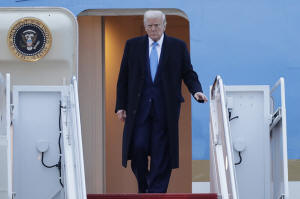Trump says he's not backing down on tariffs, calls them 'medicine' as
markets reel
[April 07, 2025] By
ADRIANA GOMEZ LICON and FATIMA HUSSEIN
WEST PALM BEACH, Fla. (AP) — President Donald Trump said Sunday that he
won't back down on his sweeping tariffs on imports from most of the
world unless countries even out their trade with the U.S., digging in on
his plans to implement the taxes that have sent financial markets
reeling, raised fears of a recession and upended the global trading
system.
Speaking to reporters aboard Air Force One, Trump said he didn't want
global markets to fall, but also that he wasn't concerned about the
massive sell-off either, adding, "sometimes you have to take medicine to
fix something.”
His comments came as global financial markets appeared on track to
continue sharp declines once trading resumes Monday, and after Trump's
aides sought to soothe market concerns by saying more than 50 nations
had reached out about launching negotiations to lift the tariffs.
“I spoke to a lot of leaders, European, Asian, from all over the world,"
Trump said. "They’re dying to make a deal. And I said, we’re not going
to have deficits with your country. We’re not going to do that, because
to me a deficit is a loss. We’re going to have surpluses or at worst,
going to be breaking even.”
The higher rates are set to be collected beginning Wednesday, ushering
in a new era of economic uncertainty with no clear end in sight.
Treasury Secretary Scott Bessent said unfair trade practices are not
“the kind of thing you can negotiate away in days or weeks.” The United
States, he said, must see “what the countries offer and whether it's
believable.”
Trump, who spent the weekend in Florida playing golf, posted online that
“WE WILL WIN. HANG TOUGH, it won’t be easy.” His Cabinet members and
economic advisers were out in force Sunday defending the tariffs and
downplaying the consequences for the global economy.

“There doesn’t have to be a recession. Who knows how the market is going
to react in a day, in a week?" Bessent said. “What we are looking at is
building the long-term economic fundamentals for prosperity.”
U.S. stock futures dropped on Sunday night as the tariffs continued to
roil the markets. S&P 500 futures were down 2.5% while that for the Dow
Jones Industrial Average shed 2.1%. Nasdaq futures were down 3.1%. Even
the price of bitcoin, which held relatively stable last week, fell
nearly 6% Sunday.
Asian shares, meanwhile, nosedived. Tokyo’s Nikkei 225 index lost nearly
8% shortly after the market opened. By midday, it was down 6%. A circuit
breaker briefly suspended trading of Topix futures after an earlier
sharp fall in U.S. futures. Chinese markets also tumbled, with Hong
Kong’s Hang Seng dropping 9.4%, while the Shanghai Composite index lost
6.2%.
Trump’s tariff blitz, announced April 2, fulfilled a key campaign
promise as he acted without Congress to redraw the rules of global
trade. It was a move decades in the making for Trump, who has long
denounced foreign trade deals as unfair to the U.S. He is gambling that
voters will be willing to endure higher prices for everyday items to
enact his economic vision.
Countries are scrambling to figure out how to respond to the tariffs,
with China and others retaliating quickly.
Top White House economic adviser Kevin Hassett acknowledged that other
countries are “angry and retaliating,” and, he said, “by the way, coming
to the table.” He cited the Office of the U.S. Trade Representative as
reporting that more than 50 nations had reached out to the White House
to begin talks.
Adding to the turmoil, the new tariffs are hitting American allies and
adversaries alike, including Israel, which is facing a 17% tariff.
Israeli Prime Minister Benjamin Netanyahu is set to visit the White
House and speak at a press conference with Trump on Monday, with his
office saying the tariffs would be a point of discussion with Trump
along with the war in Gaza and other issues.
Another American ally, Vietnam, a major manufacturing center for
clothing, has also been in touch with the administration about the
tariffs. Trump said Vietnam’s leader said in a telephone call that his
country “wants to cut their Tariffs down to ZERO if they are able to
make an agreement with the U.S.” And a key European partner, Italian
Premier Giorgia Meloni, said she disagreed with Trump’s move but was
“ready to deploy all the tools — negotiating and economic — necessary to
support our businesses and our sectors that may be penalized."
[to top of second column] |

President Donald Trump walks down the stairs of Air Force One upon
his arrival at Joint Base Andrews, Md., Sunday, April 6, 2025. (AP
Photo/Luis M. Alvarez)
 Commerce Secretary Howard Lutnick
made clear there was no postponing tariffs that are days away.
“The tariffs are coming. Of course they are,” he said, adding that
Trump needed to reset global trade. But he committed only to having
them “definitely” remain “for days and weeks.”
In Congress, where Trump’s Republican Party has long championed free
trade, the tariff regiment has been met with applause but also
significant unease.
Several Republican senators have already signed onto a new
bipartisan bill that would require presidents to justify new tariffs
to Congress. Lawmakers would then have to approve the tariffs within
60 days, or they would expire. Nebraska GOP Rep. Don Bacon said
Sunday that he would introduce a House version of the bill, saying
that Congress needs to restores its powers over tariffs.
“We gave some of that power to the executive branch. I think, in
hindsight, that was a mistake,” said Bacon, adding that getting a
measure passed would be challenging unless the financial markets
continue to react negatively and other indicators such as inflation
and unemployment shift.
Wyoming's John Barrasso, the No. 2 member of the Senate's GOP
leadership, said Trump is “doing what he has every right to do.”
But, he acknowledged, “there is concern, and there’s concern across
the country. People are watching the markets.”
“There’ll be a discussion in the Senate,” Barrasso said of the
tariffs. “We’ll see which way the discussion goes.”
Trump's government cost-cutting guru, billionaire businessman Elon
Musk, had been relatively silent on Trump’s tariffs, but said at a
weekend event in Italy that he would like to see the U.S. and Europe
move to "a zero-tariff situation.” The comment from the Tesla owner
who leads Trump's Department of Government Efficiency drew a rebuke
from White House trade adviser Peter Navarro.
“Elon, when he is on his DOGE lane, is great. But we understand
what's going on here. We just have to understand. Elon sells cars,”
Navarro said. He added: “He's simply protecting his own interest as
any business person would do.”
Trump indicated he disagreed with Musk, saying Sunday of the
European Union, “They want to talk, but there’s no talk unless they
pay us a lot of money on a yearly basis.”
Lawrence Summers, an economist who was treasury secretary under
Democratic President Bill Clinton, said Trump and his economic team
are sending contradictory messages if they say they are interested
in reviving manufacturing while still being open to negotiating with
trade partners.
If other countries eliminate their tariffs, and the U.S, does, too,
he said, "it’s just making a deal, then we don’t raise any revenue
nor do we get any businesses to relocate to the United States. If
it’s a permanent revenue source and trying to get businesses to
relocate to the United States, then we’re going to have these
tariffs permanently. So the president can’t have it both ways.”

Bessent was on NBC's “Meet the Press,” Hassett and Summers appeared
on ABC's “This Week,” Lutnick and Barrasso were on CBS' “Face the
Nation” and Navarro was interviewed on Fox News Channel's “Sunday
Morning Futures.”
___
Gomez Licon reported from Fort Lauderdale, Florida. Associated Press
writer Giada Zampano in Rome contributed to this report.
All contents © copyright 2025 Associated Press. All rights reserved |